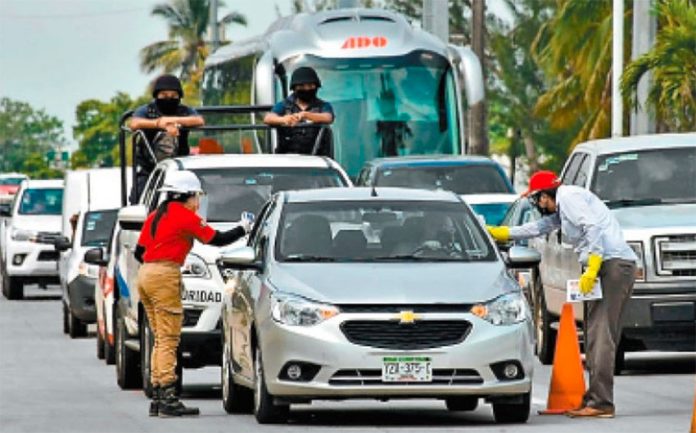Authorities in at least eight states have decided to implement new coronavirus restrictions due to a spike in case numbers.
In Tamaulipas, where case numbers have increased by almost 500% since June 1, authorities have decided to ban the sale of alcoholic beverages this weekend and nonessential businesses are required to shut their doors by 5:00 p.m. on a daily basis.
Public transit is only permitted to operate at 50% capacity in the northern border state while there are restrictions on people’s movement between the hours of 10:00 p.m. and 5:00 a.m.
Authorities in the neighboring state of Nuevo León have also implemented a 10:00 p.m.-5:00 a.m. curfew and and restaurants have been told that they can’t accept any sit-down diners. Nonessential services have also been suspended in the state, where coronavirus case numbers have surged more than 600% since June 1.
In Yucatán, Governor Mauricio Vila has once again implemented a ley seca, or dry law, prohibiting the purchase of alcohol all week, and residents are banned from using their cars between the hours of 10:30 p.m. and 5:00 p.m. Nonessential businesses must shut by 6:00 p.m. and the state’s marinas have been closed.
Mérida, the Yucatán capital and the state’s largest city, currently has the third largest active coronavirus outbreak in Mexico, with 803 cases.
Farther east, the southern half of Quintana Roo returned to “red light” restrictions this week due to an increase in case numbers and high occupancy levels in hospitals.
Hotels, restaurants and theme parks in the municipalities of Felipe Carillo Puerto, José María Morelos, Bacalar and Othón P. Blanco are only permitted to operate at 15% capacity, while the “red light”rules required churches, theaters, hair salons, malls and bars to close.
In Veracruz – which has the fourth highest case tally among Mexico’s 32 states – security authorities carried out operations on Wednesday to partially shut down the downtown areas of cities in 38 municipalities, while bars and nightclubs have been ordered to close in San Luis Potosí, where coronavirus case numbers have recently spiked.
In Nayarit, businesses are only permitted to operate at 30% capacity and police are carrying out patrols to ensure that citizens comply with restrictions. Governor Antonio Echevarría García warned in late June that the consequences could be dire if people didn’t heed the call to act responsibly.
Authorities in Colima are expected to announce new restrictions today that could include the mandatory use of face masks and stricter rules for nonessential businesses.
Deputy Health Minister Hugo López-Gatell said Tuesday that the epidemic in the small Pacific coast state is in a growth phase.
Colima has recorded 980 confirmed cases since the start of the pandemic, of which 219, or 22%, are currently active.
Source: Milenio (sp)
